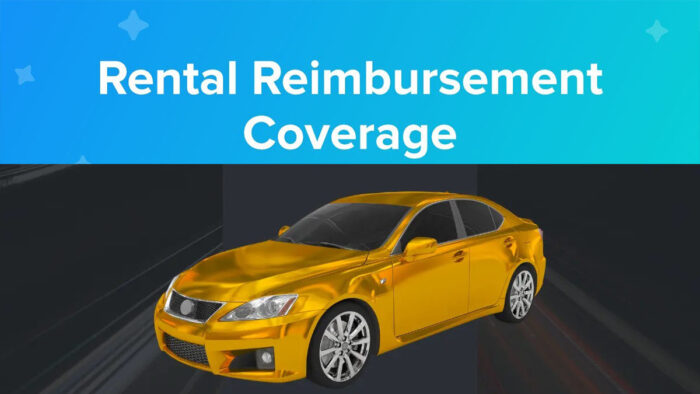Rental reimbursement coverage is designed to pay for your transportation costs and keep you going when your primary vehicle isn’t available.

This coverage covers the cost of a rental car while your car is being repaired or is in the shop. When your car insurance policies have comprehensive and collision coverage, rental reimbursement coverage will be added.
Typically, you’ll have to pay a fee to add this coverage because auto insurance doesn’t come with a reimbursement. After the fee has been paid, you’ll then get coverage for any accident your comprehensive or collision insurance covers.
How Does Rental Reimbursement Work?
When there’s an accident, the driver who caused the accident covers the cost of any damages. For instance, let’s say someone hits your car and then has it sent to the shop. Their insurance may likely pay for the repairs and for the rental car that will drive you while your car is being repaired.
And if you happen to be the cause of the accident, then your liability insurance will cover up the costs for the other driver’s rental car, which means you’ll be the one covering the cost of your own damaged car, but if you have collision coverage, then it will cover the cost of your repair while you pay for a rental and wait.
Having collision coverage helps pay for the cost of repairs to your car, even when you’re at fault for an accident. Collision coverage works well with comprehensive coverage, which covers floods and theft.
What Does Rental Reimbursement Cover?
Rental reimbursement only pays for the cost of a rental vehicle while repairs are made to your car due to a covered loss, such as a collision or comprehensive claim.
It does not cover routine maintenance, vacation rentals, or other expenses like gas or security deposits. Your insurance company will reimburse you up to a daily limit for the rental rate.
Do I Need Rental Reimbursement Coverage?
Renting a car can be a convenient option, but the costs can quickly add up, especially if your vehicle is in the shop for an extended period. To manage this expense, you may want to consider adding rental reimbursement insurance to your auto insurance policy.
Rental reimbursement insurance can be a valuable addition to your policy, particularly if you don’t have the flexibility in your budget to cover the cost of a rental car. This coverage can help reimburse you for the daily rental fees while your car is being repaired.
The cost of rental reimbursement insurance can vary depending on your location. It’s important to research the typical rental rates in your area and choose a coverage limit that aligns with those costs. If the reimbursement limit is too low, you may end up paying the difference out of pocket.
For those who rely on their vehicle and don’t have access to alternative transportation while it’s in the shop, rental reimbursement insurance can be a valuable safeguard. The relatively low cost of adding this coverage to your policy may be worth the peace of mind it provides.
How Expensive is Rental Reimbursement Insurance?
The price of rental reimbursement coverage can vary based on the duration you anticipate needing a rental, your vehicle type, and the insurance provider you select.
The more you use your car, the higher the coverage you may require. It’s essential to consider your location as well.
While insurance companies often secure favorable rates with rental providers, the nearest rental car company may not be their preferred choice.
For example, if your insurer partners with a company but you are surrounded by Enterprise locations, you could face increased rental expenses.
Moreover, rental car reimbursement is applicable only for incidents covered by your policy, necessitating the inclusion of collision or comprehensive coverage if you lack them.
To ensure you have the most suitable policy at a competitive rate, it is advisable to compare auto insurance quotes from different providers. Shopping around allows you to find the best coverage for your needs while securing the most cost-effective insurance policy available.
Frequently Asked Questions
How much coverage do I need?
Rental reimbursement policies have daily and total claim maximums. The daily limit is the most your insurer will pay per day for the rental.
The total per-claim amount is the maximum reimbursement after each accident, either a dollar value or a time limit. Determine the coverage you need based on rental rates in your area and how important having a car is to you.
When does rental reimbursement coverage apply?
Rental reimbursement coverage kicks in when your vehicle is being repaired due to a covered claim, such as a collision or comprehensive loss.
It does not apply for routine maintenance, breakdowns, or if your car is stolen and you need a temporary replacement. The coverage is designed to help offset the cost of renting a car while yours is in the shop for covered repairs.
Can I choose any rental car company?
With rental reimbursement coverage, you typically have the flexibility to use any rental car provider you prefer.
However, some insurers may have preferred partners that offer discounted rates, which could save you money. It’s a good idea to check with your insurance company about any rental car company affiliations or discounts before booking a rental.
How long does rental reimbursement coverage last?
The duration of rental reimbursement coverage is usually tied to the time it takes to repair your vehicle after a covered claim. Most policies have a daily limit, such as $30 per day, and a maximum total limit, like $900 per claim.
Once you reach the maximum total limit, the coverage will no longer apply, even if your car is still in the shop. Be sure to understand the specific limits of your policy.



